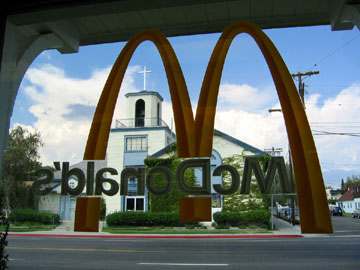|
Denominations; Toothpaste; Denominations loyalty; Protestant Denominations
Denominations, Toothpaste,
and Toilet Paper
by Rev. Dr. Mark D. Roberts
Copyright © 2009 by Mark D. Roberts
Note: You may download this resource at no cost, for personal use or for use in a Christian ministry, as long as you are not publishing it for sale. All I ask is that you give credit where credit is due. For all other uses, please contact me at mark@markdroberts.com. Thank you.
Denominations, Toothpaste, and Toilet Paper: Just the Facts, Ma'am
Part 1 of series: Denominations, Toothpaste, and Toilet Paper
Permalink for this post / Permalink for this series
A recent USA Today headline caught my eye: “U.S. Protestants more loyal to toothpaste brand than church?” Ouch! This isn’t something that a clergyman from a Protestant denomination wants to read in the morning paper. But, like it or not, I did read the USA Today story. And, like it or not, I did discover that American Protestants are more loyal to their toothpaste brand than to their denomination. Also to their toilet paper. Double ouch!
If you’ve been reading my blog for a while, you know that I weigh in occasionally on the nature and condition of Christian denominations. For example:
What’s Good About Denominations?
Why Not Just Leave the PC(USA)?
The End of the PC(USA) Revisited
So, given my interest in denominational tidings, I thought chip in my two cents on the issue of denominations and toothpaste.
First, the facts. The USA Today story was based on a study done by Ellison Research of Phoenix, Arizona. From their website, it appears that Ellison Research is primarily a marketing research firm for business clients, with several non-profit clients as well. Ellison Research specializes in studies for Christian organizations, and claims familiarity with the Christian community.
The research on Christian denominations and toothpaste was published on January 12, 2009. It was based on a survey of 1007 American adults, including 471 regular churchgoers. A summary of findings can be found in a press release (PDF format).
Overall, Ellison Research found that 30% American churchgoers would consider only one denomination. This figure includes Roman Catholics, who are much more loyal than Protestants. 60% of Catholics would consider attending only a Catholic church. Meanwhile, only 16% of Protestants exhibit this kind of denominational loyalty, though 67% of Protestants have some sort of denominational preference.
What is perhaps even more surprising to me is that Protestants who attend non-denominational churches are much more committed to being non-denominational than Protestants who are allied with a denomination. Here’s what Ellison Research found:
People who worship at a non-denominational congregation were asked the same question about their loyalty to attending a non-denominational church. People who attend a non- denominational church are actually more loyal to remaining non-denominational than churchgoers in Protestant denominations are to staying within their own denomination.
In fact, 29% of non-denominational churchgoers would only consider a non-denominational church.
 Ellison Research then asked churchgoers about their loyalty to other “brands” beside churches. As it turns out, Protestants are more loyal to their denomination than to their favored brands of fast food restaurants (3%), bottled water (7%), computers (9%), and soft drinks (14%). Yet denominational loyalty ranks below Protestant loyalty to brands of toothpaste (22%) and toilet paper (19%). (Photo: Yes, you can even get toilet paper that comes in a toothpaste-type tube. I wonder if that raises the level of brand loyalty.) Ellison Research then asked churchgoers about their loyalty to other “brands” beside churches. As it turns out, Protestants are more loyal to their denomination than to their favored brands of fast food restaurants (3%), bottled water (7%), computers (9%), and soft drinks (14%). Yet denominational loyalty ranks below Protestant loyalty to brands of toothpaste (22%) and toilet paper (19%). (Photo: Yes, you can even get toilet paper that comes in a toothpaste-type tube. I wonder if that raises the level of brand loyalty.)
So, there you have, in the iconic words of Joe Friday, “just the facts, ma’am.” Denominational loyalty is lower than toothpaste and toilet paper loyalty. So what does this mean? What should we think of this? Is it bad? Good? Neutral? Tomorrow I’ll offer some thoughts on the implications of “just the facts.”
Why Are Protestants More Loyal to Their Toothpaste Than to Their Denomination?
Part 2 of series: Denominations, Toothpaste, and Toilet Paper
Permalink for this post / Permalink for this series
In yesterday’s post I summarized the results of an Ellison Research that found American Protestants to be more loyal to their brand of toothpaste than to their brand of church (i.e. denomination). Although I have neither the technical details nor the expertise to evaluate the accuracy of these findings, they make sense to me intuitively and experientially.
For sixteen years I was the Senior Pastor of Irvine Presbyterian Church (PCUSA). During that time we received something like a thousand new members. I met most of these in our new members’ class, and heard something of their religious background. I’d guess that, at most, a third of those joining our church had been Presbyterians before. The solid majority came from a wide range of religious traditions, including: Baptist, Roman Catholic, Episcopalian, Methodist, Vineyard, and non-denominational. Some of our new members had been raised as Jews, Muslims, or atheist/agnostics. Even those who had been Presbyterian did not chose our church primarily because it was the only Presbyterian church in town. Their Presbyterian background got them to visit, but they were joining because they affirmed our vision, connected with our people, and felt drawn to God through our worship and other ministries.
So it doesn’t surprise me that only 16% of Protestants are so loyal to their denomination that, if they moved, they would only consider a new church within their denomination. Nevertheless, it’s worth wondering why this is so. I can think of many reasons, several of which were anticipated by yesterday’s commenters.
The language of the Ellison Research study used the language of branding. People are more loyal to their brand of toothpaste than their brand of church, that is, their denomination. This conclusion suggests a fundamental question:
What is my brand of church?
Many people, including the Ellison Research folk, would say that my brand is Presbyterian. That is true, in a way. But it is also profoundly untrue, in another way. Let me explain.
Yes, I’ve been a Presbyterian for most of my life, though I was baptized a Methodist and attended Assembly of God, Catholic, and Mennonite churches while in college and grad school. Nevertheless, as an ordained minister of Word and Sacrament in the Presbyterian Church (USA), I’m about as Presbyterian as one can get. I have served in Presbyterian churches for the last 25 years and continue to be active in a Presbyterian church even though I’m no longer on the staff.
Yet I don’t think of myself primarily as a Presbyterian, but as a Christian. I am first and foremost a disciple of Jesus Christ. My basic brand, as I think of it, is Christian, not Presbyterian. In my current position as Senior Director of Laity Lodge, I am regularly interacting with Methodists, Episcopalians, Baptists, and others. I join them in worship either in their churches or at Laity Lodge. Inevitably, what I experience in these settings is the sense of just how much we have in common as Christians. What we have in common is much more pronounced that where we differ. Sure, the Episcopalians use wine in the Eucharist, while the Presbyterians use grape juice in the Lord’s Supper, but we are united in remembering Christ’s death for us and in our reliance on his grace.
When I was senior pastor of Irvine Presbyterian Church, I made no effort to build brand loyalty to Presbyterianism. I wanted my church members to be loyal first and foremost to Jesus Christ. I rarely talked about the Presbyterian Church and its benefits. Instead, I talked endlessly about Christ and his benefits.
Moreover, when people moved away from our area and sought my advice about churches where they lived, I never limited my recommendations to Presbyterian churches. Yes, I did always try to find some strong Presbyterian churches in their region. But it was not my goal as their pastor to make sure they remained Presbyterian. Rather, I wanted them to be in healthy, Christ-centered, Bible-based, gospel-driven churches, no matter the denomination. I’ll admit that I was usually just a bit happier when folks who moved away joined a strong Presbyterian church. But my main concern was for the quality of church, not its denominational label.
 I remember one time, in particular, when friends from Irvine moved to a suburb of Chicago. Jim and Sherry were died-in-the-wool Presbyterians who had been valuable leaders at Irvine Presbyterian Church. There was, in fact, a Presbyterian church in their new town. But it was relatively lifeless. Moreover, it’s youth ministry was pathetic, and my friends had three teenagers. Jim and Sherry tried other Presbyterian churches nearby, but found more or less the same situation. (Photo: Worship at Irvine Presbyterian Church) I remember one time, in particular, when friends from Irvine moved to a suburb of Chicago. Jim and Sherry were died-in-the-wool Presbyterians who had been valuable leaders at Irvine Presbyterian Church. There was, in fact, a Presbyterian church in their new town. But it was relatively lifeless. Moreover, it’s youth ministry was pathetic, and my friends had three teenagers. Jim and Sherry tried other Presbyterian churches nearby, but found more or less the same situation. (Photo: Worship at Irvine Presbyterian Church)
 Almost in desperation, they decided to visit Willow Creek Community Church, a “seeker-sensitive” megachurch not to far from their home. The Sunday morning worship service hardly felt like church to them, though they had positive things to say about the quality of the sermon. But their children loved the youth groups. These weren’t just about entertaining program, but rather were committed to helping young people become Christians and grow in their Christian faith. After several visits to Willow Creek, Jim and Sherry felt terribly confused. Should they leave the Presbyterian denomination? How could they abandon their denomination for a non-denominational megachurch. (Photo: Worship at Willow Creek Community Church.) Almost in desperation, they decided to visit Willow Creek Community Church, a “seeker-sensitive” megachurch not to far from their home. The Sunday morning worship service hardly felt like church to them, though they had positive things to say about the quality of the sermon. But their children loved the youth groups. These weren’t just about entertaining program, but rather were committed to helping young people become Christians and grow in their Christian faith. After several visits to Willow Creek, Jim and Sherry felt terribly confused. Should they leave the Presbyterian denomination? How could they abandon their denomination for a non-denominational megachurch. (Photo: Worship at Willow Creek Community Church.)
When Jim and Sherry called me for advice, I listen to their experiences and concerns. After they were finished, I asked one question: “Where do you think your children will be helped in their growth as disciples of Jesus?” Their answer was unequivocal: “At Willow Creek.” My response was equally unequivocal: “Then that’s where you should go.” Did I wish they had found a good Presbyterian church? I expect so. But as long as Jim, Sherry, and their children were going to a Christian church, and an excellent one at that, then I wasn’t concerned that they were switching brands. At the deepest level, and the one that matters most, they were staying with the “Christian brand.”
In my conversation with Jim and Sherry, I also realized that, in some ways, I sensed more “brand loyalty” to Willow Creek than to certain churches in my own denomination. I’ll say more about this in my next post.
At any rate, I would answer the question: Why are Protestants more loyal to their toothpaste than to their denomination? by saying this: For many Protestants, the brand of "Christian" means far more than any denominational label. They are, first and foremost, Christians, and not Presbyterians or Methodists or Baptists.
Why Are Protestants More Loyal to Their Toothpaste Than to Their Denomination? Section 2
Part 3 of series: Denominations, Toothpaste, and Toilet Paper
Permalink for this post / Permalink for this series
Yesterday I began reflecting on the recent discover that Protestants in American are more loyal to their toothpaste than to their denomination. I suggested that, for many of us, we consider our “brand” to be Christian rather than “Presbyterian” or “Methodist” or whatever. But I believe there are other reasons why Protestants are happier to switch denominations than from Crest to Colgate.
Denominations are an Inconsistent Brand
Brands, it seems to me, get loyalty by consistency. I must confess that I frequent the McDonald’s brand of fast food. Partly it’s a matter of convenience. Partly it’s because McDonald’s places franchises in airport terminals. Partly it’s because almost all McDonald’s now have Wi-Fi Internet connections. And, partly it’s because McDonald’s is consistent.
 In fact, McDonald’s is tediously consistent. You can almost always count on McDonald’s to be conveniently located and scrupulously clean. The menu, conspicuously located on the wall, is virtually identical to the menu in any other McDonald’s venue. This is true even if you travel overseas, with some notable exceptions. I remember once going to a McDonald’s in Switzerland and being surprised to find beer on the menu. And even throughout the U.S. you can sometimes discover regional differences among McDonald’s menus. But, for the most part, a Big Mac is a Big Mac is a Big Mac. Period. You can count on it. (Photo: A tray of European McDonald’s food, including beer.) In fact, McDonald’s is tediously consistent. You can almost always count on McDonald’s to be conveniently located and scrupulously clean. The menu, conspicuously located on the wall, is virtually identical to the menu in any other McDonald’s venue. This is true even if you travel overseas, with some notable exceptions. I remember once going to a McDonald’s in Switzerland and being surprised to find beer on the menu. And even throughout the U.S. you can sometimes discover regional differences among McDonald’s menus. But, for the most part, a Big Mac is a Big Mac is a Big Mac. Period. You can count on it. (Photo: A tray of European McDonald’s food, including beer.)
The same is true with toothpaste brands, by the way. Crest in Massachusetts is the same as Crest in California. Colgate in Texas is just like Colgate in Wisconsin. Trustworthy brand consistency.
 But not when it comes to Protestant denominations. You can usually find a wide variety of church experiences within any single denomination. Take my denomination, for example, the Presbyterian Church (USA). Just look at us. You can find Gothic or Georgian Presbyterian churches that are well over a hundred years old, and ultra-modern churches built within the last decade. They look nothing alike, and there’s no way you can be sure from a distance what sort of church you’re seeing. If, on the other hand, you catch a glimpse of the golden arches along the highway, you know you’re passing a McDonald’s restaurant. (Photo: You know exactly where I was having lunch. But you can’t be sure what brand of church was across the street. You get extra credit if you can tell me where this church is and identify it's denomination. Clue: This is one of my favorite towns.) But not when it comes to Protestant denominations. You can usually find a wide variety of church experiences within any single denomination. Take my denomination, for example, the Presbyterian Church (USA). Just look at us. You can find Gothic or Georgian Presbyterian churches that are well over a hundred years old, and ultra-modern churches built within the last decade. They look nothing alike, and there’s no way you can be sure from a distance what sort of church you’re seeing. If, on the other hand, you catch a glimpse of the golden arches along the highway, you know you’re passing a McDonald’s restaurant. (Photo: You know exactly where I was having lunch. But you can’t be sure what brand of church was across the street. You get extra credit if you can tell me where this church is and identify it's denomination. Clue: This is one of my favorite towns.)
And that’s just the outside. You’ll find just as much variation on the inside. Some Presbyterian churches worship in traditional sanctuaries with hardwood pews and large pipe organs. Other Presbyterian churches worship in worship centers or school auditoriums with folding chairs and rock bands. Many Presbyterian churches offer both extremes. And then there’s everything in between.
You might expect a fair amount of theological consistency within denominations. This may be true for some, but not in the PC(USA) and similar mainline denominations. Some of our churches are very conservative theologically, holding the Bible as the infallible or inerrant Word of God and salvation to be found only in Jesus Christ. Other PC(USA) churches accept the Bible as one, fallible authority among many, and believe that people can be saved in a wide variety of ways. I know Presbyterian pastors who believe that all people will be saved no matter whether they have a relationship with Christ or not. And I know Presbyterian pastors who think that one must have an explicit faith in Christ in order to be saved.
Let me offer one more salient example that features the “pet issue” of the PC(USA). A good friend of mine is a Presbyterian pastor who upholds biblical authority even when it’s unpopular. Thus he believes that sex outside of heterosexual marriage is wrong and is willing to say so when needed. He doesn’t spend much time preaching about sex. But when he does, he speaks plainly in light of his convictions.
Several years ago my friend was preaching on a passage that dealt with marriage. During his sermon, he mentioned briefly that Scripture does not support sexual intimacy outside of marriage between a man and a woman. At that moment, a couple stood up and left the church service, obviously intending to express their public disapproval of my friend’s point. The couple had been visiting, and, obviously, they never came back. Some time later my friend learned that the man who left was a Presbyterian pastor from another part of the country. Not only did he disagree with my friend, but he did so with enough passion to march out of the service.
This story illustrates one more way that the Presbyterian Church (USA), like most mainline denominations, is utterly diverse. If you visit a PC(USA) congregation next Sunday, you’ll have no way of knowing in advance what that church teaches about human sexuality.
So the Presbyterian “brand” is terribly inconsistent, even within one branch of American Presbyterianism. It gets more complicated when you remember that there are multiple Presbyterian denominations. This means that if you move from one place to another, you simply cannot predict whether the Presbyterian church in your new community will be anything like the one in your former community. In fact, the Methodist church in your new town may be much more like the Presbyterian church in your former town than the Presbyterian church in the new town.
The inconsistency of denominational brands has much to do with the lack of denominational loyalty among Protestants in America. You’d find the same with toothpaste if it varied as widely as churches. If Crest in California tasted like mint, while Crest in Texas tasted like bubblegum, you can be fairly sure that Crest lovers from one state would switch brands when they moved to the other state.
|

